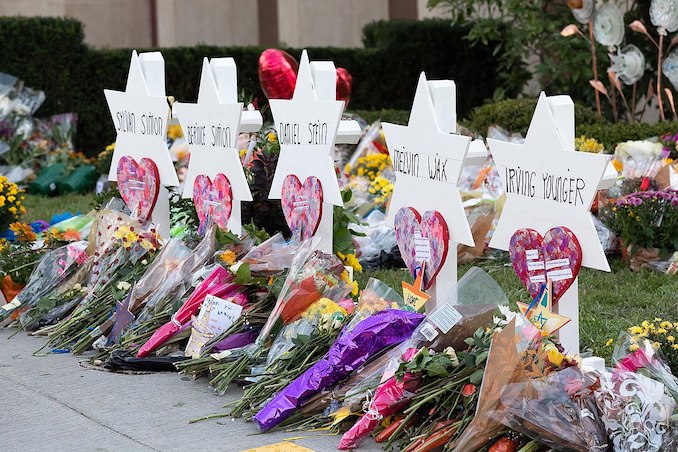Tree of Life One Year Anniversary: Reflections From a Jewish Gun Violence Prevention Advocate
To me, being Jewish is hard. It involves so much memory of suffering and endurance in the present. But it is also where I gather my strength to believe that freedom for everyone is possible. To me, Judaism is “suffering to be free.” I have prayed after many shootings in America. I have prayed for mothers who have lost their
October 24, 2019, 5:00 am
By Lily Gordon
To me, being Jewish is hard. It involves so much memory of suffering and endurance in the present. But it is also where I gather my strength to believe that freedom for everyone is possible. To me, Judaism is “suffering to be free.”
I have prayed after many shootings in America. I have prayed for mothers who have lost their children, for survivors managing trauma, and for communities reeling from death. And yet, the refrain “thoughts and prayers” in the wake of a shooting has too long been used as a cop-out from real action to protect communities from the devastation of gun violence. As someone who is Jewish, faith is central to who I am, and more importantly, how I act. My faith compels me to believe that peace and safety is possible and convicts me to advocate for the end of gun violence.
As we approach the anniversary of the massacre at the Tree of Life synagogue in Pittsburgh, in the days following many of the Jewish holidays, I am painfully reminded of why I am working to prevent future gun violence.
This past Monday, I was celebrating Simchat Torah, the Jewish holiday that recognizes the conclusion of the public Torah reading before it begins again. It was a beautiful moment, full of dancing, singing, shouting, celebration, and life. And yet, as the celebrations came to a close, my friend solemnly murmured that it was officially a week until the one year anniversary of the massacre at the Tree of Life, and that many of us would be mourning the lives lost that horrible day. As her voice broke on her words, I felt the pain and loss of death in my heart and saw it on the faces of my friends who stood around me.
That awful pairing of joy and mourning reminded me of what it felt like to be a Jew one year ago in the wake of the shooting at the Tree of Life, to face the fatal horrors of anti-Jewish hatred, and to seek out Jewish love and Jewish community for healing. In the midst of my fear and pain, I did not run from my Jewish identity but rather held more tightly to it than I had before. I did so by coming into community with other Jews—lighting candles, singing, crying, listening to the rabbis, and witnessing so many non-Jews come out to support us with loving solidarity. I did so by committing to community for the long-term.
Approaching this anniversary, I am reminded of the following poem by Muriel Rukeyser:
“To be a Jew in the twentieth century
Is to be offered a gift. If you refuse,
Wishing to be invisible, you choose
Death of the spirit, the stone insanity
Accepting, take full life. Full agonies:
Your evening deep in labyrinthine blood
Of those who resist, fail, and resist; and God
Reduced to a hostage among hostages.
The gift is torment. Not alone the still
Torture, isolation; or torture of the flesh.
That may come also. But the accepting wish,
The whole and fertile spirit as guarantee
For every human freedom, suffering to be free,
Daring to live for the impossible.”
To me, being Jewish is hard. It involves so much memory of suffering and endurance in the present. But it is also where I gather my strength to believe that freedom for everyone is possible. To me, Judaism is “suffering to be free.”
As we approach the one year anniversary of this day of loss, we mourn, we pray, and we reflect. And I promise that from this place of mourning, we will fight for that day that no religious or ethnic group will fear violence. And we will do so from a movement of solidarity and love that incorporates people of all faiths and non-faiths.
One week out from Sukkot (the Jewish Festival of Tabernacles), I think of the sukkah—the word for the flimsy shelter we built to remind us of how we lived in exodus and the word used to call upon God’s canopy of peace each week during Shabbat. If peace is as fragile as a sukkah, then I will imagine shelter from violence as something that itself requires protection. And if peace is as low to the ground as a sukkah, then I will envision change as low to the ground, requiring grassroots organizing from the bottom up. And if peace is as communal as a sukkah, then I will witness the ingathering of people like me and the invitation of people who are unlike me to enter under this canopy so that we may weather the storms together on our journey to a better world.
Let us remember:
Joyce Fienberg zt”l,75
Richard Gottfried zt”l, 65
Rose Mallinger zt”l, 97
Jerry Rabinowitz zt”l, 66
Cecil Rosenthal zt”l, 59
David Rosenthal zt”l, 54
Bernice Simon zt”l, 84
Sylvan Simon zt”l, 86
Daniel Stein zt”l, 71
Melvin Wax zt”l, 88
Irving Younger zt”l, 69
May their memory be for a blessing.






